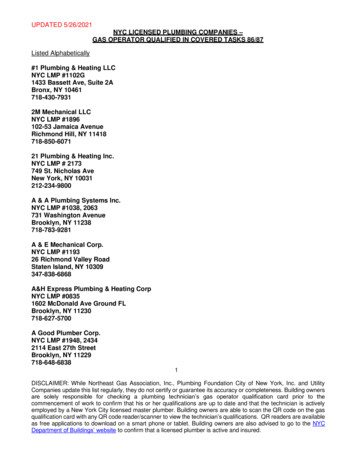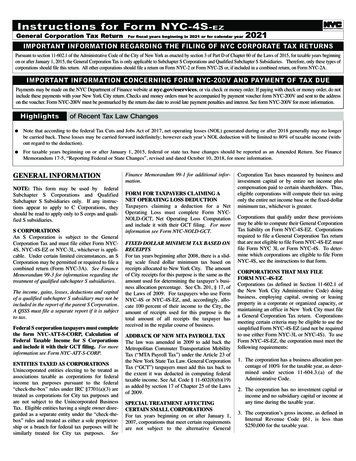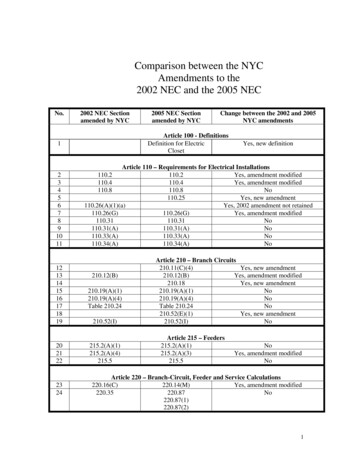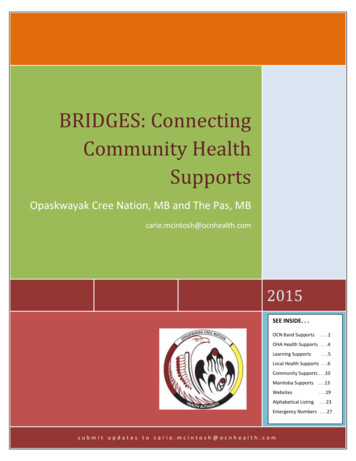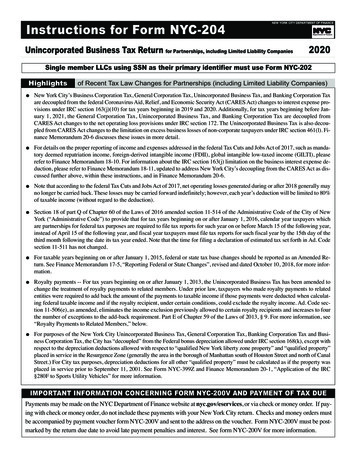
Transcription
NEW YORK CITY DEPARTMENT OF FINANCEInstructions for Form NYC-204Unincorporated Business Tax Return for Partnerships, including Limited Liability Companies2020Single member LLCs using SSN as their primary identifier must use Form NYC-202Highlightsof Recent Tax Law Changes for Partnerships (including Limited Liability Companies) New York City’s Business Corporation Tax, General Corporation Tax, Unincorporated Business Tax, and Banking Corporation Taxare decoupled from the federal Coronavirus Aid, Relief, and Economic Security Act (CARES Act) changes to interest expense provisions under IRC section 163(j)(10) for tax years beginning in 2019 and 2020. Additionally, for tax years beginning before January 1, 2021, the General Corporation Tax, Unincorporated Business Tax, and Banking Corporation Tax are decoupled fromCARES Act changes to the net operating loss provisions under IRC section 172. The Unincorporated Business Tax is also decoupled from CARES Act changes to the limitation on excess business losses of non-corporate taxpayers under IRC section 461(l). Finance Memorandum 20-6 discusses these issues in more detail. For details on the proper reporting of income and expenses addressed in the federal Tax Cuts and Jobs Act of 2017, such as mandatory deemed repatriation income, foreign-derived intangible income (FDII), global intangible low-taxed income (GILTI), pleaserefer to Finance Memorandum 18-10. For information about the IRC section 163(j) limitation on the business interest expense deduction, please refer to Finance Memorandum 18-11, updated to address New York City’s decoupling from the CARES Act as discussed further above, within these instructions, and in Finance Memorandum 20-6. Note that according to the federal Tax Cuts and Jobs Act of 2017, net operating losses generated during or after 2018 generally mayno longer be carried back. These losses may be carried forward indefinitely; however, each year’s deduction will be limited to 80%of taxable income (without regard to the deduction). Section 18 of part Q of Chapter 60 of the Laws of 2016 amended section 11-514 of the Administrative Code of the City of NewYork (“Administrative Code”) to provide that for tax years beginning on or after January 1, 2016, calendar year taxpayers whichare partnerships for federal tax purposes are required to file tax reports for such year on or before March 15 of the following year,instead of April 15 of the following year, and fiscal year taxpayers must file tax reports for such fiscal year by the 15th day of thethird month following the date its tax year ended. Note that the time for filing a declaration of estimated tax set forth in Ad. Codesection 11-511 has not changed. For taxable years beginning on or after January 1, 2015, federal or state tax base changes should be reported as an Amended Return. See Finance Memorandum 17-5, “Reporting Federal or State Changes”, revised and dated October 10, 2018, for more information. Royalty payments -- For tax years beginning on or after January 1, 2013, the Unincorporated Business Tax has been amended tochange the treatment of royalty payments to related members. Under prior law, taxpayers who made royalty payments to relatedentities were required to add back the amount of the payments to taxable income if those payments were deducted when calculating federal taxable income and if the royalty recipient, under certain conditions, could exclude the royalty income. Ad. Code section 11-506(e), as amended, eliminates the income exclusion previously allowed to certain royalty recipients and increases to fourthe number of exceptions to the add-back requirement. Part E of Chapter 59 of the Laws of 2013, § 9. For more information, see“Royalty Payments to Related Members,” below. For purposes of the New York City Unincorporated Business Tax, General Corporation Tax, Banking Corporation Tax and Business Corporation Tax, the City has “decoupled” from the Federal bonus depreciation allowed under IRC section 168(k), except withrespect to the depreciation deductions allowed with respect to “qualified New York liberty zone property” and “qualified property”placed in service in the Resurgence Zone (generally the area in the borough of Manhattan south of Houston Street and north of CanalStreet.) For City tax purposes, depreciation deductions for all other “qualified property” must be calculated as if the property wasplaced in service prior to September 11, 2001. See Form NYC-399Z and Finance Memorandum 20-1, “Application of the IRC§280F to Sports Utility Vehicles” for more information.IMPORTANT INFORMATION CONCERNING FORM NYC-200V AND PAYMENT OF TAX DUEPayments may be made on the NYC Department of Finance website at nyc.gov/eservices, or via check or money order. If paying with check or money order, do not include these payments with your New York City return. Checks and money orders mustbe accompanied by payment voucher form NYC-200V and sent to the address on the voucher. Form NYC-200V must be postmarked by the return due date to avoid late payment penalties and interest. See form NYC-200V for more information.
Instructions for Form NYC-204 - 2020Page 2GENERAL INFORMATIONyears beginning in 1995 that electedto continue to be subject to the Unincorporated Business Tax foryears after 1995 on a timely filedUnincorporated Business Tax return for tax year beginning in 1996continue to be subject to the Unincorporated Business Tax.PARTNERSHIP DEFINEDFor purposes of this form, “partnerships” includesyndicates, groups, pools, joint ventures, limitedliability companies (other than single-memberLLCs) and other unincorporated or incorporatedorganizations classified as partnerships for federal income tax purposes, through or by means ofwhich any business, profession, financial operation or venture is carried on. An estate or trust isnot a partnership and must file using form NYC202EIN.b)WHO MUST FILEFor tax years beginning in 2009 or later, any partnership that carries on or liquidates any trade,business, profession or occupation wholly orpartly within New York City and has a total grossincome from all business regardless of where carried on of more than 95,000 (prior to any deduction for cost of goods sold or servicesperformed) must file an Unincorporated BusinessTax Return on Form NYC-204.Taxpayers that are required to file an Unincorporated Business Tax Return but have no tax liabilitymay be eligible to file a Form NYC-204EZ. To determine whether you may use Form NYC-204EZ,refer to that form. The Form NYC-204EZ may alsobe used by a partnership that is not required to filebut wishes to disclaim any liability for tax becauseit is engaged solely in activities that are exempt fromthe tax.Income received from the practice of law,medicine, dentistry, architecture, or anyother profession is subject to the unincorporated business tax.3)S corporations are not subject to the Unincorporated Business Tax. S Corporations aresubject to the General Corporation Tax.4)The Unincorporated Business Tax doesnot apply to:a)any entity subject to the tax imposedby Title 11, Chapter 6 of the NYC Administrative Code. For taxable yearsbeginning in 1996 and thereafter, unincorporated associations and publicly-traded partnerships taxable ascorporations for federal income taxpurposes under IRC §7701(a) (3) and§7704 are subject to the applicablecorporate tax under Title 11, Chapter6 of the NYC Administrative Codeand not the Unincorporated BusinessTax. However, unincorporated entities that were subject to the Unincorporated Business Tax for taxc)any entity carrying on an insurancebusiness as a member of the NewYork Insurance Exchange (authorized in Section 6201 of the Insurance Law);d)Real Estate Mortgage InvestmentConduits (REMICs). Holders of interests in a REMIC remain taxableon such interests or on the incomefrom such interests.e)Wireless Telecommunications ServiceProvidersEffective for tax periods beginningon and after August 1, 2002, entitiesthat receive eighty percent or more oftheir gross receipts from charges forproviding mobile telecommunications services to customers will betaxed as if they were regulated utilities for purposes of the New YorkCity Utility Tax and UnincorporatedBusiness Tax. Thus, such entitieswill be subject to only the New YorkCity Utility Tax. The amount ofgross income subject to tax has beenamended to conform to the FederalMobile Telecommunications Sourcing Act of 2000. In addition, for taxyears beginning on and after August1, 2002, partners in any partnershipsubject to the Utility Tax as a “utility” as defined in Ad. Code section11-1101(6) will not be subject to Unincorporated Business Tax on theirdistributive share of the income ofany such entity.WHO IS SUBJECT TO THE TAX1) The Unincorporated Business Tax is imposed on any individual or unincorporatedentity (including a partnership, fiduciary orcorporation in liquidation) engaged in anytrade, business, profession, or occupationwholly or partly carried on within New YorkCity.2)any entity subject to the tax imposed by Title 11, Chapter 11 (Utility Tax) of the NYC AdministrativeCode (except that vendors of utilityservices are subject to the unincorporated business tax on that percentage of their entire net incomeallocable to the City which theirnon-utility receipts bear to theirtotal receipts);5)Full Exemption for Investment Activities:A partnership, except a dealer as defined inAdmin. Code §11-501(l), will not bedeemed engaged in an unincorporated business solely by reason of the conduct of thefollowing activities for its own account: thepurchasing, holding or selling of property(defined below), engaging in transactions inpositions in property, the acquisition, holding or disposition, other than in the ordinarycourse of business, of interests in unincorporated entities also eligible for this exemp-tion, and any other activity not constitutingan unincorporated business subject to theUnincorporated Business Tax.Property Defined. Property for this purpose includes real and personal property, including property qualifying as investmentcapital (see instructions for Schedule D ofthis form), and other stocks and securities,notional principal contracts, derivative financial instruments and other positions inproperty but excluding property and positions in property held by a dealer, and excluding debt instruments acquired in theordinary course of a trade or business andcertain other property. See Admin. Code§11-502(c)(i)(A).Notwithstanding anything to the contrary,the receipt of 25,000 or less of gross receipts during the taxable year (determinedwithout regard to deductions) from an unincorporated business will not disqualify thetaxpayer for this exemption.Partial Exemption for Investment Activities: (Admin. Code §11-502(c)(4)) For taxable years beginning after 1995, if ataxpayer is an unincorporated entity (not anindividual) and is primarily engaged in1.the activities described above under“Full Exemption for Investment Activities ”or2.the ownership as an investor of interests in one or more other unincorporated entities engaged in anunincorporated business in the City.The taxpayer’s own activities described at(1) and the activities of any other unincorporated entity primarily engaged in the activities described at (1) and (2) in whichthe taxpayer holds an interest will not beconsidered an unincorporated business carried on by the taxpayer and the incomefrom those activities will not be subject tothe tax.A taxpayer will be considered to be primarily engaged in the activities described at(1) and (2) if at least 90 percent of the average monthly gross value of its total assetsconsists of:a.property as defined above,b.interests in unincorporated entities not engaged in any unincorporated business in the City, andc.interests held as an investor inentities engaged in an unincorporated business in the City.For this purpose, real property and marketable securities are valued at their fairmarket value and all other assets are valuedaccording to the books and records of thetaxpayer in accordance with generally accepted accounting principles (GAAP).Investor Defined: For this purpose, a tax-
Instructions for Form NYC-204 - 2020Page 3payer will be considered to hold an interestin another entity as an investor if either:(i)the entity would qualify as primarilyengaged in the activities described at(1) and (2) above and the taxpayer’sshare of each item of the entity’s income, gain, deduction, credit or loss isnot materially different from the taxpayer’s share of any other such item,or(ii) the taxpayer is neither a general partnernor managing or participating in the dayto-day business of the other entity. SeeAdmin. Code §11-502 (c) (1) (B).A taxpayer claiming a partial exemption forinvestment activities should attach a copy ofForm NYC-WPE (Worksheet for Partial Exemption). The partial exemption is illustrated by the following examples:Example 1:In 1996, Partnership A is engaged directlyin the purchase and sale of stocks and securities for its own account in the City. Partnership A also is a limited partner inPartnership B, which is engaged in the purchase and sale of securities for its own account in the City. Partnership A also is anon-managing member of Limited LiabilityCompany C, which is a securities dealer inthe City. LLC C is subject to tax on all ofits income. Partnership B is wholly exemptfrom tax.Partnership A is not eligible for the full investment exemption. However, PartnershipA qualifies as primarily engaged in activities described at (1) and (2). Therefore, A isnot taxable on its own self-trading activitynor on its share of B’s income from selftrading. A is taxable on its share of C’s income, gains and losses, including anyincome, gains and losses from C’s own selftrading activity. Partnership A is not treatedas a dealer solely by reason of its membership in LLC C.Example 2:The facts are the same in example 1 exceptthat C is also a limited partner in Partnership D, which is engaged solely in the purchase and sale of securities for its ownaccount in the City. LLC C’s interest inPartnership D represents less than 90 percent of C’s gross assets. Partnership D isexempt from tax because it is solely tradingfor its own account. C is taxable on itsshare of D’s self-trading income because Cdoes not qualify as primarily engaged in theactivities described at (1) and (2). A is taxable on its share of C’s income includingC’s share of D’s self-trading income.Example 3:The facts are the same as in example 2 except that C’s interest in Partnership D represents 95 percent of C’s gross assets. Cqualifies as primarily engaged in the activities described at (1) and (2). Therefore C isfor by a person other than the personwhose vehicle is parked, garaged orstored, such as a merchant validationof a parking ticket);not taxable on its share of D’s self-tradingincome. A is taxable on its share of C’s income other than C’s share of D’s self-trading income.6)A partnership that is an owner, lessee or fiduciary will not be deemed engaged in an unincorporated business solely by reason of theholding, leasing or managing of real property.For taxable years beginning on or after July 1,1994, if an individual or unincorporated entityis carrying on an unincorporated business inwhole or in part in the City, and is also holding, leasing or managing real property as anowner, lessee or fiduciary, the holding, leasing or managing of the property will not beconsidered an unincorporated business to theextent that the real property is held for the purposes of producing rental income or gain onthe disposition of the real property, provided,however, this partial exemption for rentalreal estate is not available to a dealer holding real property primarily for sale to customers in the ordinary course of thedealer’s trade or business. The operation byany taxpayer, otherwise eligible for the partialexemption, of a garage or other business at theproperty solely for the benefit of tenants in theproperty that is not open or available to thegeneral public will be considered to be incidental to the holding, leasing or managing ofthe property and will not be considered an unincorporated business. However, if such a taxpayer operates a garage or other business atthe property that also is open or available tothe general public, that garage or other business will be considered a taxable unincorporated business, provided, however, for taxableyears beginning after 1995, if a taxpayer operates a garage that is open to building tenantsand the public, the operation of that garagewill not be considered a taxable unincorporated business but only to the extent of incomefrom parking services provided at that garageto building tenants on a monthly or longerterm basis and only if the information required to be filed with this return specifiedbelow is provided with respect to thatgarage. All other income from the operationof that garage will be subject to the tax.The taxpayer must submit with this return astatement containing the following for eachgarage or other similar facility that is operated for the benefit of building tenants andthat is open to the general public:1.the parking facility address;3.the license number of the facility if applicable;4.the licensed capacity of the facility iflicensed;5.the total number of transactions andamount of receipts for the taxable yearfrom all sales of parking services including prepaid parking services, allparking services provided withoutcharge and all parking services paidthe total number of transactions andamount of receipts from sales ofmonthly or longer term parking services including a designation of eachtransaction and receipt as exempt fromthe 8 percent Manhattan parking tax,where applicable; and7.the total number of transactions andamount of receipts from sales ofmonthly or longer term parking services provided to building tenants.Failure to submit the above informationwith this return will result in all of the income of that garage being subject to tax.See Section 11-502 (d) of the NYC Administrative Code.NOTE: If you engage exclusively in an exemptunincorporated business activity but file forinformation purposes, use Form NYC-204EZ.ROYALTY PAYMENTS TO RELATEDMEMBERSFor tax years beginning on or after January 1,2013, the Unincorporated Business Tax was beenamended to change the treatment of royalty payments to related members. Under prior law, taxpayers who made royalty payments to relatedentities were required to add back the amount ofthe payments to taxable income if they were deducted when calculating federal taxable income.To avoid double taxation, if the royalty recipientwas also a New York taxpayer, the statute allowed the recipient to exclude the royalty incomeif the related member added back the deductionfor the royalty payment expense.Ad. Code section 11-506(e), as amended, eliminates the income exclusion previously allowed tocertain royalty recipients. It also modifies thetwo previous exceptions to the add-back requirement and adds two additional exceptions. Thosefour exceptions generally can apply in followingsituations (for additional conditions that must bemet, see sections indicated below): If all or part of the royalty payment a relatedmember received was then paid to an unrelated third party during the tax year, thatportion of the payment will be exempt if thetransaction giving rise to the original royalty payment to the related member was undertaken for a valid business purpose, andthe related member was subject to tax on theroyalty payment in this city or another citywithin the United States or a foreign nationor some combination thereof (Ad. Code section 11-506(e)(2)(B)(i)); If the taxpayer's related member paid an aggregate effective rate of tax on the royaltypayment, to this city or another city withinthe United States or some combinationthereof, that is not less than 80 percent ofthe rate of tax that applied to the taxpayerthe parking facility name;2.6.
Instructions for Form NYC-204 - 2020under Ad. Code section 11-503 for the taxyear (Ad. Code section 11-506(e)(2)(B)(ii)); If the related member is organized under thelaws of a foreign country that has a taxtreaty with the United States, the relatedmember’s income from the transaction wastaxed in such country at an effective rate oftax at least equal to that imposed by thiscity, and the transaction giving rise to theroyalty was undertaken for a valid businesspurpose and reflected an arm's length relationship.(Ad. Code section 11506(e)(2)(B)(iii)); orIf the taxpayer and the Department of Financeagree to alternative adjustments that more appropriately reflect the taxpayer's income.(Ad. Code section 11-506(e)(2)(B)(iv)).The law as amended also defines the term “related member” by linking it to the definition inInternal Revenue Code section 465(b)(3)(c), butsubstituting 50 percent for the 10 percent ownership threshold.OTHER FORMS YOU MAY BEREQUIRED TO FILEFORM NYC-5UB - Partnership Declaration ofEstimated Unincorporated Business Tax must befiled by every partnership carrying on an unincorporated business or profession in New YorkCity and whose estimated tax can reasonably beexpected to exceed 3,400 for the tax year immediately following the tax year covered by thisreturn.The declaration must cover a full calendar or fiscal year and is due on the 15th day of the fourthmonth of the taxable year.For further information about estimated tax payments and due dates see Form NYC-5UB.FORM NYC-EXT - Application for Automatic 6month Extension of Time to File Business Income Tax Return. File Form NYC-EXT on orbefore the due date of the return.FORM NYC-115 - Unincorporated Business TaxReport of Change in Taxable Income made by theInternal Revenue Service and/or New York StateDepartment of Taxation and Finance must beused for reporting adjustments in taxable incomeresulting from an Internal Revenue Service auditof your federal income tax return and/or a NewYork State Department of Taxation and Financeaudit of your State income tax return for taxableyears beginning prior to January 1, 2015 only.FORM NYC-221 - Underpayment of EstimatedUnincorporated Business Tax will help you determine if you have underpaid an estimated taxinstallment and, if so, compute the penalty due.FORM NYC-399 - Schedule of New York CityDepreciation Adjustments must be used to compute the allowable New York City depreciationdeduction if you claim the federal ACRS orMACRS depreciation deduction for certain property placed in service after December 31, 1980.See the instructions for Form NYC-399.Page 4FORM NYC-399Z - Depreciation Adjustments forCertain Post 9/10/01 Property may have to be filedby taxpayers claiming depreciation deductions forcertain sport utility vehicles or "qualified property," other than “qualified property” placed inservice in the Resurgence Zone, "qualified NewYork Liberty Zone property" and "qualified NewYork Liberty Zone leasehold improvements"placed in service after September 10, 2001 for federal or New York State tax purposes. See “Highlights of Recent Tax Law Changes”, FinanceMemorandum 20-1, “Application of IRC§280FLimits to Sport Utility Vehicles” and instructionsto NYC-399Z.FORM NYC-CR-A - Commercial Rent Tax Annual Return must be filed by every tenant thatrents premises for business purposes in Manhattan south of the center line of 96th Street andwhose annual or annualized rent for any premisesis at least 200,000. (Effective June 1, 2001).FORM NYC-RPT - Real Property Transfer TaxReturn must be filed when the partnership acquires or disposes of an interest in real propertylocated in New York City, including a leaseholdinterest; when there is a partial or complete liquidation of the partnership that owns or leasesreal property; or when there is transfer of a controlling economic interest in a partnership thatowns or leases real property.FORM NYC-WPE- A Partial Exemption Worksheet must be filed for every partnership claiminga partial exemption for investment activities.FORM NYC-NOLD-UBTP - Net Operating LossDeduction schedule must be included in the unincorporated business tax filing of every unincorporated business claiming a net operating lossdeduction.WHEN TO FILEFor taxable years beginning on or after January 1,2020, Form NYC-204 is due on or before March15, 2021, or, for fiscal year taxpayers, on or before the 15th day of the third month following theclose of the taxable year.If a partnership is terminated and completely liquidated during its normal taxable year, resultingin an accounting period of less than 12 monthsfor federal income tax purposes, the due date isthe 15th day of the third month following the endof the accounting period.An automatic extension of six months for filingthis return will be allowed if, within the time prescribed for filing, the taxpayer files with the Department of Finance Form NYC-EXT and pays theamount properly estimated as its tax. See the instructions for Form NYC-EXT for information regarding what constitutes a properly estimated taxfor this purpose. Failure to pay a properly estimated amount will result in a denial of the extension.No additional extension for filing a return will begranted beyond the six-month extension, unlessthe taxpayer is outside the United States. (Taxpayers outside the United States should refer to19 RCNY Section 28-18(c)(3) for additional extensions.)WHERE TO FILEAll returns, except refund returns:NYC Department of FinanceP.O. Box 5564Binghamton, NY 13902-5564Remittances - Pay online with Form NYC-200Vat nyc.gov/eservices, or Mail payment andForm NYC-200V only to:NYC Department of FinanceP.O. Box 3933New York, NY 10008-3933Returns claiming refunds:NYC Department of FinanceP.O. Box 5563Binghamton, NY 13902-5563NOTE: If a Declaration of EstimatedUnincorporated Business Tax (Form NYC-5UB)is being filed, DO NOT mail it to any addresslisted here. It should be mailed to the address indicated on Form NYC-5UB.ACCESSING NYC TAX FORMSBy Computer - Download forms from the Finance website at nyc.gov/financeBy Phone - Order forms by calling 311. Ifcalling from outside of the five NYC boroughs, please call 212-NEW-YORK (212-6399675).BUSINESS CARRIED ON BOTHINSIDE AND OUTSIDE NEW YORK CITYIf business is carried on both inside and outside NewYork City, a fair and equitable portion of the business income shall be allocated to New York City.If the unincorporated business does not carry onbusiness both inside and outside of New YorkCity, all of the business income shall be allocatedto New York City. (Refer to the instructions forSchedule E, Business Allocation Schedule.)BUSINESS TERMINATED DURINGTAXABLE YEARIf the business was terminated during 2020, attach a statement to Form NYC-204 showing disposition of the business property and how it wasreported on the return. Check the box markedfinal return on page 1 of the return.USE OF FEDERAL FIGURESExcept where otherwise indicated, items of businessincome, gain, loss or deduction are to be entered onthe return as reportable for federal tax purposes. Allitems reported on Form NYC-204 derived from federal partnership returns are, however, subject to verification, audit and revision by the Department ofFinance. Report the character of a partner’s share ofincome, gains, losses and deductions from a partnership as if it were realized directly by the partner regardless of how the partner acquired its partnership
Instructions for Form NYC-204 - 2020interest and regardless of whether the partner’s shareof such items is disproportionate to its interest in capital. The preceding sentence does not apply to guaranteed payments or other payments to the partnertreated as made to one who is not a partner for federalincome tax purposes, and does not affect the treatmentof any item as being derived from an unincorporatedbusiness carried on in the City by the partner.FEDERAL OR NEW YORK STATECHANGESFor taxable years beginning on or after January 1,2015, changes in taxable income or other tax basemade by the Internal Revenue Service (“IRS”)and /or New York State Department of Taxationand Finance (“DTF”) will no longer be reportedon Form NYC-115. Instead, taxpayers must report these federal or state changes to taxable income or other tax base by filing an amendedreturn. This amended return must include a taxworksheet that identifies each change to the taxbase (“Tax Base Change”) and shows how eachsuch Tax Base Change affects the taxpayer’s calculation of its New York City tax. A template forthe tax worksheet is available on the DOF website at nyc.gov/finance. This amended returnmust also include a copy of the IRS and/or DTFfinal determination, waiver, or notice of carrybackallowance. Taxpayers that have federal and stateTax Base Changes for the same tax period may report these changes on the same amended returnthat includes separate tax worksheet for the IRSTax Base Changes and the DTF Tax BaseChanges.The Amended Return checkbox on the return is tobe used for reporting an IRS or DTF Tax BaseChanges, with the appropriate box for the agencymaking the Tax Base Changes also checked. Taxpayers must file an amended return for Tax BaseChanges within 90 days after (i) a final determination on the part of the IRS or DTF, or (ii) thesigning of a waiver under IRC §6312(d) or NYTax Law §681(f).If the taxpayer believes that any Tax Base Changeis erroneous or should not apply to its City taxcalculation, it should not incorporate that TaxBase Change into its City tax calculation on itsamended return. However, the taxpayer must attach: (i) a statement to its report that explains whyit believes the adjustment is erroneous or inapplicable; (ii) the tax worksheet that identifies eachTax Base Change and shows how each would affect its City tax calculation; and (iii) a copy of theIRS and/or DTF final determination or waiver.For more information on federal or state Tax BaseChanges, including a more expansive explanationof how taxpayers must report these changes aswell as
placed in service prior to September 11, 2001. See Form NYC-399Z and Finance Memorandum 20-1, "Application of the IRC §280F to Sports Utility Vehicles" for more information. NEW YORK CITY DEPARTMENT OF FINANCE Payments may be made on the NYC Department of Finance website at nyc.gov/eservices, or via check or money order. If pay-
